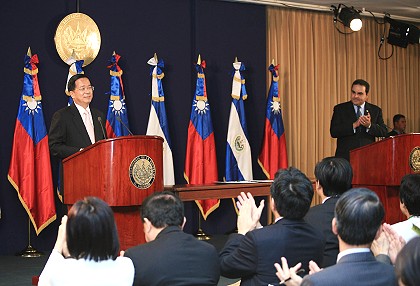President Chen Delivers Address to Legislative Assembly of El Salvador

President Chen Shui-bian at 4:40 p.m. on August 24 El Salvador time (August 25, 6:40 a.m., Taipei time), addressed the Legislative Assembly of the Republic of El Salvador.
President Chen said President of the Legislative Assembly Ruben Orellana invited him to speak, offering him an opportunity to deliver remarks in this sanctuary of democracy. He said he is deeply touched and delighted to be afforded this opportunity, and reiterated his warmest regards and appreciation to the members of the Legislative Assembly and guests on behalf of the people and government of Taiwan.
The president said Taiwan and El Salvador have similar histories in the pursuit of democracy and freedom. Both countries were ruled by dictators in the past. El Salvador then experienced a civil war that lasted 12 years. During that period, nearly every household in El Salvador lost at least one family member to the conflict. The war resulted in the destruction of many homes and public infrastructure, creating incalculable property losses and forcing a large scale migration of people elsewhere. The president then described Taiwan's history, noting that Taiwan experienced martial law for a world-record length of 38 years. Democracy activists were arrested by the authorities and trials and judgments were handed out in military tribunals that operated under martial law. This tragic period of history on Taiwan shows how the road to democracy was stained with blood and tears, he said.
The president said that while the democratic achievements of Taiwan have been lauded throughout the world, what is regrettable is that Taiwan is unable to become a "normal country" like El Salvador. Due to the strong opposition by China, Taiwan's attempts to join and participate in global organizations like the United Nations (UN) and the World Health Organization have been stymied. China's actions have obstructed Taiwan from having the opportunity to take part in the international community. Taiwan, however, will not give up, the president said. The president added that surveys show 77% of the Taiwan populace hopes that Taiwan will enter the UN. Given this overwhelming public support, Taiwan is moving forward with a plan to hold a referendum on whether it should apply to enter the UN under the name "Taiwan." The president said Taiwan hopes to use the means of a referendum so that the people can have a direct voice in the decision and to let the world hear the calls by the people of Taiwan hoping that the UN will admit "Asia's beacon of democracy" -- Taiwan.
After finishing his address, President Chen visited the Supreme Court of El Salvador, where President of the Supreme Court Agustin Garcia Calderon was waiting at the door to welcome him. President Chen was escorted to a conference room in the court building where he greeted all of the supreme court justices. With a background in law himself, President Chen expressed his admiration and respect for those in El Salvador working to defend the law. He also expressed his hope that Taiwan and El Salvador in the future can work together and provide mutual support, enabling each nation to chalk up even more achievements in the area of judicial experience and reforms.
At around 7 p.m. (August 25, 9 a.m., Taipei time), the president and his entourage made a visit to a local refuge for orphans and abandoned children, expressing his best wishes and providing encouragement to the children.